Spoiled for Choice: Making Sense of the Humanscale Keyboard Tray Configurator
Like most reviews sites, our editorial staff and laboratory testing expenses are partially offset by earning small commissions (at no cost to you) when you purchase something through those links. Learn More

If you came here directly after trying to configure a Humanscale Keyboard Tray, then we owe you a quick apology. We’re sorry for dumping all those numbers and letters on you, they scared us at first too. So, we’re here to tell what they all mean. Bear with us, and we’ll try to make sense of the dizzying range of options. There’s a Humanscale keyboard for everyone; it’s time to design yours.
Mechanism
The mechanism is the component that mounts to your desk, holds your keyboard tray, and gives it mobility. Mechanisms come in a few different flavors, but there are some constants. All options here come standard with a 22” track length unless otherwise noted, both shorter and longer options are available, depending on how much clear real estate you have on the underside of your desk. Adjustable-height users take note: most adjustable desks have a central crossbar running along the underside of their tabletops. The 11″ rail will fit, but won’t allow full retraction of the tray. By and large, this isn’t really an issue – a treadmill desk is a large-footprint workstation to begin with, and stowing the tray won’t really change that. All mechanisms offer 360° swivel and all, except for the KM, can be tilted from 0 to -15°. So, without further ado, here are your choices:
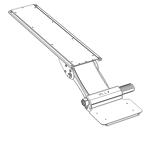 6G (Black), 6GW (White): The newest, slimmest option among the mechanisms with upgraded flexibility, offers adjustment from 5.5” below the track to 1.5” above the track.
6G (Black), 6GW (White): The newest, slimmest option among the mechanisms with upgraded flexibility, offers adjustment from 5.5” below the track to 1.5” above the track.
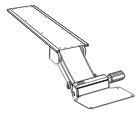 5G (Black), 5GV (Platinum): Similar to the 6G, advertised as strongest arm on the market, offers adjustment from 5” below the track to 1.25” above the track.
5G (Black), 5GV (Platinum): Similar to the 6G, advertised as strongest arm on the market, offers adjustment from 5” below the track to 1.25” above the track.
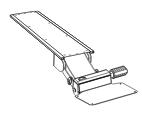 5GSM (Black), 5GSV (Platinum): Short-track version of 5G for smaller office spaces. Comes standard with 18” track. Offers adjustment from 3.5” below the track to .5” above the track.
5GSM (Black), 5GSV (Platinum): Short-track version of 5G for smaller office spaces. Comes standard with 18” track. Offers adjustment from 3.5” below the track to .5” above the track.
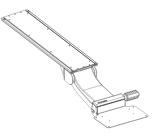 5GAD (Black): Above desk version of 5G with extended arm. Comes standard with 27” track. Offers adjustment from 6” below the track to 7.5” above the track. Potentially useful for taller treadmill desks whose variable-height desks do not come up to a sufficient height.
5GAD (Black): Above desk version of 5G with extended arm. Comes standard with 27” track. Offers adjustment from 6” below the track to 7.5” above the track. Potentially useful for taller treadmill desks whose variable-height desks do not come up to a sufficient height.
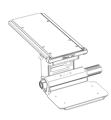 6F (Black) , 6FW (White): Exclusively for use with height-adjustable desks, which compensate for these models’ fixed height. These may work well for shorter treadmill desk users, but their lack of vertical adjustment makes them a gamble for anyone over about 6′ tall unless their desk can rise well above the 47″ watermark that many sit-to-stand desks are designed to reach (remember you’re adding 6″ for the treadmill’s height to the equation).
6F (Black) , 6FW (White): Exclusively for use with height-adjustable desks, which compensate for these models’ fixed height. These may work well for shorter treadmill desk users, but their lack of vertical adjustment makes them a gamble for anyone over about 6′ tall unless their desk can rise well above the 47″ watermark that many sit-to-stand desks are designed to reach (remember you’re adding 6″ for the treadmill’s height to the equation).
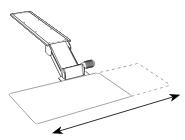 Additionally, note that the LS, or lateral slide option, gives a keyboard tray an additional 8” of lateral mobility. This accessory would be something to consider if your optimal tray position is obstructed, or if you’re concerned about being able to fix your mount in the perfect spot.
Additionally, note that the LS, or lateral slide option, gives a keyboard tray an additional 8” of lateral mobility. This accessory would be something to consider if your optimal tray position is obstructed, or if you’re concerned about being able to fix your mount in the perfect spot.
Keyboard Platforms
Considerations include shape and size – be sure to pick an option that can accommodate your chosen keyboard. Additionally, keep in mind that the 500, 550, 400, and 259 options cannot have a mouse tray attached, and that the 259 is exclusively for use with the 6F, and 6FW mechanisms. Those on the hunt for a simple, rectangular tray should look no further than the 900, the standard, most popular variant.
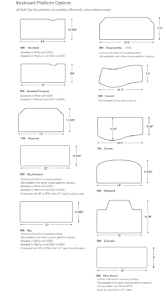 Check the picture on the left for a full-size graphic of possible keyboard tray options.
Check the picture on the left for a full-size graphic of possible keyboard tray options.
Mouse Platforms
These small accessories allow independent adjustment of a mouse platform. They come highly recommended – the ideal position for a keyboard isn’t necessarily the ideal position for a mouse. With a mouse tray, users can adjust their hand position dependent on preference and type of mouse. Clip platforms attach to rails on either the left or right side of most Humanscale keyboard platforms. They offer unmatched mobility, as a user can slide them forward and back along their rails, rotate them in any direction, adjust their height or depth, and tilt them independently of the keyboard platform. Swivel platforms attach to one of the front corners of the keyboard platform, and can be stowed underneath it when not in use. However, they lack the full mobility of clip platforms, and cannot be angled independently of the keyboard platform. The M2 swivel option is somewhat larger, and has an elongated shape that lets a user operate a mouse closer to their body.
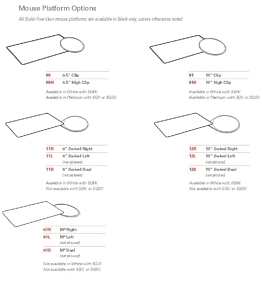 Click through for a full-sized graphic of the various options of Humanscale mouse platforms.
Click through for a full-sized graphic of the various options of Humanscale mouse platforms.
Palm Supports
The final component of a complete Humanscale Keyboard Tray, Palm supports make working a much, much more comfortable experience, and come in all shapes and sizes. The two materials available are gel and foam – which are more or less comparable; we prefer gel but it’s a subjective choice. Choose based on the size and shape of your keyboard tray. Note that the curved 300 tray is not available with palm supports.
What to do when you want to take a conventional keyboard tray off your old fixed-height desk and transfer it to your new standing desk instead? A common issue that people have when installing keyboard trays on standing desks is being incompatible with the crossbar under adjustable-height desks. iMovR’s Keyboard Tray Standing Desk Adapter Kit offers an easy workaround to this problem without sacrificing any adjustability or stability
Articles About Keyboard Tray Ergonomics That Will Interest You
• How To Avoid Carpal Tunnel Syndrome, Neck Pain And Shoulder Spasms While Typing
• How To Set The Proper Keyboard Tray Height For Maximum Ergonomic Benefits
• Is A Sedentary Desk Job, The Most Dangerous Job In The World?
• What Employers Urgently Need To Know About Kitchen Table Ergonomics

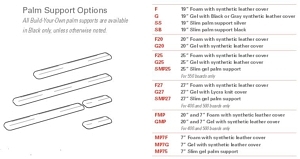
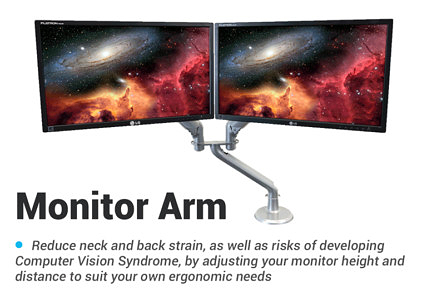
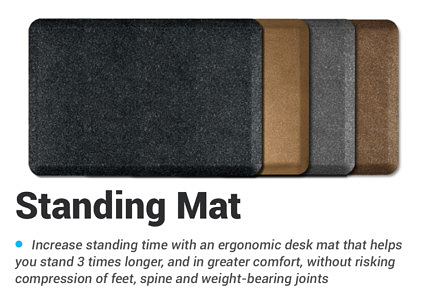
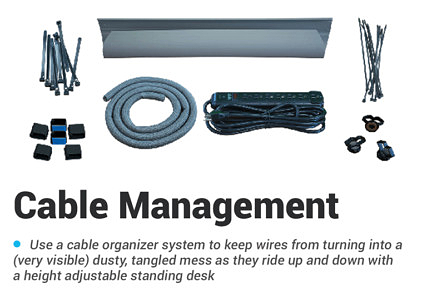
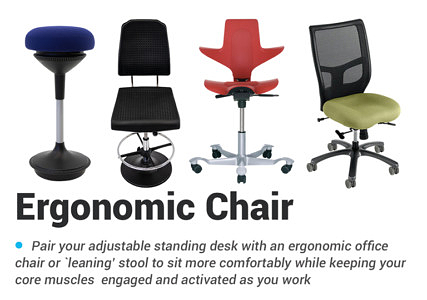
0 Comments
Leave a response >